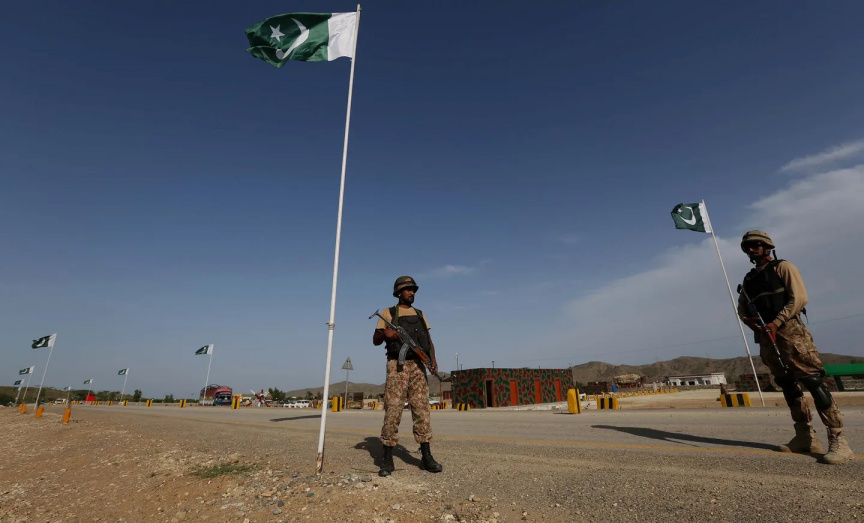
Soldiers stand guard at the Saidgai military check point in the Afghanistan border of North Waziristan, Pakistan. (Photo/AA)
Pakistan has "conducted precision aerial strikes" in Afghan border areas, a senior security official told the AFP news agency after a two-day truce ended, with Afghan Taliban officials also confirming the strikes.
The official said the "precision strike" had targeted a local group of TTP terrorists, the Gul Bahadur Group, which Islamabad says is given safe haven by Kabul.
Just before the truce ended, seven Pakistani paramilitary troops were killed in a suicide bombing and gun attack at a military camp in the North Waziristan district that borders Afghanistan, an administration official told AFP.
A faction of the terror group Tehrik-i-Taliban Pakistan (TTP) claimed responsibility for the attack.
Pakistani officials said troops prevented terrorists from entering a main military base in the ensuing gunfight, killing four terrorists in northwestern Pakistan near the Afghan border.
Pakistan's Interior Minister Mohsin Naqvi said the forces foiled the attack in North Waziristan, the province of Khyber Pakhtunkhwa, which borders Afghanistan.
An explosive-laden vehicle was rammed into the main entrance of security headquarters in Khadi village of North Waziristan, a local official told Anadolu Agency, confirming it was a suicide attack.
The latest attack came just a day after the Pakistan army said 34 terrorists were killed during operations in the North Waziristan, South Waziristan, and Bannu districts of Khyber Pakhtunkhwa.
'A heavy price'
Pakistan's new strikes came after the 48-hour truce had paused nearly a week of bloody border clashes that killed dozens of troops and civilians on both sides of the Durand Line.
"Pakistan has broken the ceasefire and bombed three locations in Paktika" province, a senior Taliban official told AFP news agency, speaking on condition of anonymity. "Afghanistan will retaliate."
Another source told AFP that civilians were among those killed in the strikes.
Pakistan's Defence Minister Khawaja Muhammad Asif earlier accused Kabul of acting as "a proxy of India" and "plotting" against Pakistan.
"From now on, demarches will no longer be framed as appeals for peace, and delegations will not be sent to Kabul," Asif wrote in a post on X, before news of the fresh strikes emerged.
"Wherever the source of terrorism is, it will have to pay a heavy price."
Security issues are at the heart of the tensions, with Pakistan accusing Afghanistan of harbouring terror groups led by TTP — on its soil, a claim Kabul denies.
"Pakistan has repeatedly shared its concerns" related to the presence of militant groups operating from Afghan soil, Pakistani foreign office spokesman Shafqat Ali Khan said in a weekly press briefing on Friday.
"Pakistan expects concrete and verifiable actions against these terrorist elements by the Taliban regime."
Rise of TTP
Pakistan had been a frontline state during the Soviet invasion of Afghanistan, hosting nearly four million Afghan refugees and serving as a conduit for international aid to anti-Soviet fighters.
Diplomatically, Pakistan was one of only three countries (alongside Saudi Arabia and the UAE) to recognise the Taliban's Islamic Emirate of Afghanistan in 1997, lobbying for international funding and providing emissary services despite UN sanctions.
Islamabad also championed Afghanistan's global integration through humanitarian aid, trade, border management, and regional collaboration.
However, the violence perpetrated by terrorist groups, especially TTP, within Pakistan has significantly strained its relations with the Afghan Taliban. The latter returned to power in Kabul following the withdrawal of US-led forces in 2021.
According to Pakistani military officials, more than 500 people, including over 311 soldiers, have been killed in attacks, largely carried out by the TTP, so far this year.
The Afghan Taliban denies Pakistani accusations. In its recent statements, it mentioned police firing in Pakistan while Kabul referred to the disputed region of Kashmir as part of India in a joint statement with New Delhi, angering Pakistan.
Afghan Taliban continues to deny supporting the terror group.
TTP is an alliance of several terror groups formed in 2007 that primarily targets Pakistan.
A 2024 UN report estimated 6,000–6,500 TTP terrorists in Afghanistan, using abandoned NATO weapons.
___
Source: TRT